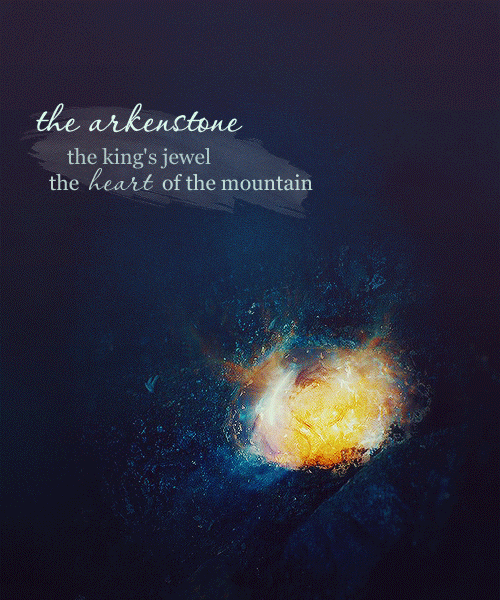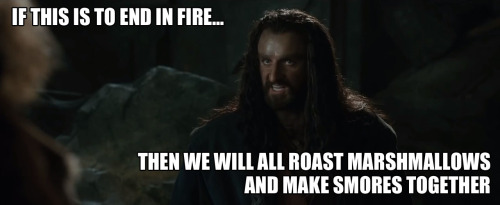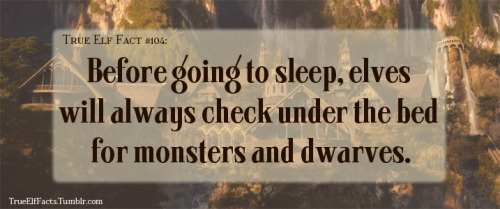Anyway...I've been really, really wanting to share with my friends how badly the second movie in 'The Hobbit' franchise 'stinks'.
This is Part 2 of a post I wrote last year on 'The Hobbit: An Unexpected Journey', which you can read here.
The Hobbit: Desolation of Smaug
I was happy with a lot of the additions that seemed to upset a lot of other fans of the book. I think the storytellers adapting the book for film have a lot of freedom in this part of the story. The book is told through Bilbo's perspective, and Bilbo is a bit of an outsider experiencing an entirely new environment.
He wouldn't know, for example, what the King of the Wood-Elves' name was, he wouldn't know much about his back-story or why he is such a jerkface.
He wouldn't have paid a whole lot of attention to the Captain of the Wood-Elf guard, or her opinion on Wood-Elf foreign policy.
And while it is likely that he did befriend Bard the Bowman/Boatman/Bargeman and he did care about the people of Laketown, he was not as privy to the political climate of Laketown as The Narrator was.
(Even if they didn't show how the Humans and Wood-Elves were real chums and not just business partners)
These were augmentations to the story line I welcomed because they were extensions of the plot in the book, not outright changes.
Now...
The Things That Stink About "The Hobbit: Desolation of Smaug"
- Beorn
In this scene, we missed a wonderful opportunity to see Gandalf perform the best magic trick ever.
It's called:
"Transforming a complete stranger into a friend."
Bear in mind (pun intended!) Beorn has no clue who Gandalf is. And the only reason Gandalf knows who Beorn is, is because Radagast mentioned him.
(So to Bilbo, he's a friend of a friend...of a friend...you might say)
We would see the TACT and COMMUNICATION strategies that would have been invaluable to the Dwarves in their later adventures, after Gandalf abandon's the company.
Because it would be a bit to much to show that adventure is more then just running, and fighting, and breaking into complete stranger's houses (...you actually have to be nice to people)!
- Music
It is not a surprise that this part of the tale is short on musical numbers (PJ's elves don't sing, and everyone else doesn't get occasion to). I did enjoy Laketown's theme.
The song that plays during the credits has cheesy lyrics.
- Azog and Bolg, The Albino Goblins Who Magically Transformed Into Orcs...
This year, I had the opportunity to sit in on a panel with Manu Bennet (the motion capture and voice actor for Azog) (You can read about it here)
It was a very interesting experience, and Manu is a really cool guy. In the interview he revealed that Bolg would be a part of the story and gave a bit of the history of the father and son pair.
Afterwards I thought, "Oh, cool! They'll finally be developing these guys as corrupted sentient creatures and not soulless villains. They'll have a bit more personality this time around...."
No. They didn't.
It wasn't even mentioned that these two "Albino Goblins Who Magically Transformed Into Orcs" are related to each other. They hardly get any interaction, and they're pretty much interchangeable characters ('scept one has scars...
so you can tell the "difference").
BOOOOO!!!!
- Mirkwood
Mirkwood of the book is 1100x better then Mirkwood in the movie in EVERY respect. This includes the moment when Bilbo rises above the depressive woodland, his mind clears, And he sees the beauty of the world around him.
(And that was a pretty good moment...even though they got the color of the butterflies wrong, and missed the fact that it was overcast that day so Bilbo COULDN'T see the Lonely Mountain or the Lake of Esgaroth. So basically, it was horrible...)
Mirkwood in the book is vast, dark and mysterious
and dangerous...
and not just because spiders live there
(don't drink the water!)
(If you see light, don't go towards it!)
Movie-Mirkwood is reminiscent the Captain Jack Sparrow Afterlife Scene in Pirates of the Carribean: More silly then scary.
- Bilbo
Many of my fellow "Hobbit" fans have said that, in this movie, Martin Freeman "is" Bilbo...That he owns the role.
No, he didn't.
And it's sad because I really think he could have. Mr Freeman is a decent actor (If you haven't seen him as John Watson in the new Sherlock series, I suggest you watch it)
But Bilbo is a more complex individual then he lets on. And Martin Freeman's portrayal of Bilbo simplifies Bilbo's character arc to such an extent that it's like hitting a single note when you could have heard the whole symphony.
This is inexcusable. Esspecially when so much detail is given to characters, situations and events that have much less to do with "The Hobbit" story!
Plus, it's NOT like this arc would have been difficult to convey in a the film medium!! In the book, BILBO'S CHARACTER TRANSFORMATION IS DEMONSTRATED IN HIS'S ACTIONS!!!
One example:
Now, PJ Would that have been so hard???? Would it??? WOULD IT???? WOULD IT?!?!??!?!
Instead we have Bilbo soullessly stabbing one spider, then killing this spider-crab thingy and vomiting in his mouth afterwards.
Really? COMON!!
No glee on his face?? No cackling laughter????? No mysterious smiles??? No taunting the spiders??????
Book-Bilbo is the type of guy who would lie to his friends...not because he's afraid, but because he's proud. He likes being impressive, and he enjoys being the "Burglar" of the Company...And "stinging" the spiders, outsmarting the Wood Elves, and taunting the dragon...
...Because he has this secret ring that makes him more powerful then any of them.
If you don't first show that Bilbo relishes his power, and that he CAN be a bit of a junkie...and he CAN be corrupted...it means a whole lot less when he rejects that power to do the RIGHT thing!!!!
In 100 years when they remake The Hobbit in ONE film (AS IT SHOULD BE!!!) Plz give Bilbo a PERSONALITY as he's gutting those spiders!
Movie-Bilbo didn't start out as pathetic as Book-Bilbo, but he doesn't grow to become as cool Book-Bilbo, either.
Previous adaptions of The Hobbit into film have downplayed the significance of The Arkenstone to the plot. I was afraid that it's thematic similarities to the one ring would prevent it from becoming a part of this story; however, in this movie, it's significance is actually accentuated to an even greater degree then it was in the book.
This was helpful to the plot. Because it's clear that The Arkenstone is not just a novelty for Thorin, it's a symbol of his authority. If he gets it, people will take him seriously and support him, even if it means taking on a dragon. To me, this change makes perfect sense.
The narrative of The Hobbit has a fantastic build up to the moment that Bilbo enters the Lonely Mountain alone. Everything you've read up to that point would suggest that the Bilbo/Smaug confrontation is going to be the climax of the book.
It's the most perfect buildup to the best psudo-climax in literary history, leading to the best climax in literary history (OK so that's just my opinion...)
The movie cannot have that same novelty, because if you are watching 'The Hobbit: Desolation of Smaug', you've probably watched the LOTR. You already know that Bilbo is going to survive the encounter.
But you don't know if the rest of The Company will.
For all the praise Ben Cumberbatch and Martin Freeman are receiving for their on screen chemistry during their face-off as Smaug and Bilbo, it's the Dwarves that really steal the show here.
Thorin and Co. are finally fighting an adversary in their native habitat. They're using strategies that ONLY Dwarves would think about because they know the environment and they understand the heart of the dragon.
AND THEY COULD DIE AT ANY MINUTE!!
It made the experience every bit the pseudo-climax I wished it could be.
In the book, the antagonism between Elves and Dwarves exists in a very mild degree, and doesn't cause much conflict in the story until the destitute Dwarves seek the help of the Wood Elves. The Elves misunderstand their intentions and are immediately suspicious of them, and lock them up. When Thorin and Co insist on maintaining the secrecy of their quest, the Elf King takes offense and locks them up indefinitely.
The whole conflict arose from a lack of trust, pride, and misunderstanding.
I felt the movie did a pretty good job of demonstrating those concepts. Mostly due to the excellent acting on the part of Richard Armitage and whatever the guy's name is who plays Thranduil.
When Thorin and Thranduil first meet. The Elvenking is completely collected, he coolly suggests a deal that will benefit both of their people and fully expects Thorin to accept it.
Then Thorin gives the Wood Elf king a piece of his mind, Thranduil appears shocked. As if he genuinely had no idea that his actions in the first movie were perceived as a betrayal.
But instead of softening, swallowing pride and apologizing, he becomes defensive about the issue.
It's not what happened in the book. It is, however, extremely true to the spirit of the book. And I loved it!
(As a footnote: Thorin later has the opportunity to let an orc kill Thranduil's son. Instead, he saves Legolas' life by killing the orc before he can strike. Again, this did not happen in the books, but still loved it.)
Elves and Dwarves are never really enemies, it just takes them a while to figure that out.
One example:
How Bilbo (in the book) Saves the Dwarves, a Step-by-Step Guide to Making Giant Spiders Angry
1. Put on ring, becoming invisible
2. Throw some stones at the spiders to get their attention
3. When spiders leave their nest, move (invisibly) to a different location
4. Sing song about how fat and stupid the spiders are
5. Throw more stones
6. Move to a new location
7. Sing taunting song
8. Repeat until all the spiders have left the nest
9. Run back to nest (silent and invisible)
10. Take off ring, cut down dwarves
(From http://sf-fantasy.suvudu.com/2012/09/tolkien-re-read-part-1-the-hobbit-chapters-8-10.html)Now, PJ Would that have been so hard???? Would it??? WOULD IT???? WOULD IT?!?!??!?!
Instead we have Bilbo soullessly stabbing one spider, then killing this spider-crab thingy and vomiting in his mouth afterwards.
Really? COMON!!
No glee on his face?? No cackling laughter????? No mysterious smiles??? No taunting the spiders??????
Book-Bilbo is the type of guy who would lie to his friends...not because he's afraid, but because he's proud. He likes being impressive, and he enjoys being the "Burglar" of the Company...And "stinging" the spiders, outsmarting the Wood Elves, and taunting the dragon...
...Because he has this secret ring that makes him more powerful then any of them.
If you don't first show that Bilbo relishes his power, and that he CAN be a bit of a junkie...and he CAN be corrupted...it means a whole lot less when he rejects that power to do the RIGHT thing!!!!
In 100 years when they remake The Hobbit in ONE film (AS IT SHOULD BE!!!) Plz give Bilbo a PERSONALITY as he's gutting those spiders!
Movie-Bilbo didn't start out as pathetic as Book-Bilbo, but he doesn't grow to become as cool Book-Bilbo, either.
And Now...For Some Book-Movie Changes That Didn't Stink (as bad)
- The Arkenstone
Previous adaptions of The Hobbit into film have downplayed the significance of The Arkenstone to the plot. I was afraid that it's thematic similarities to the one ring would prevent it from becoming a part of this story; however, in this movie, it's significance is actually accentuated to an even greater degree then it was in the book.
This was helpful to the plot. Because it's clear that The Arkenstone is not just a novelty for Thorin, it's a symbol of his authority. If he gets it, people will take him seriously and support him, even if it means taking on a dragon. To me, this change makes perfect sense.
- Smaug Confrontation
The narrative of The Hobbit has a fantastic build up to the moment that Bilbo enters the Lonely Mountain alone. Everything you've read up to that point would suggest that the Bilbo/Smaug confrontation is going to be the climax of the book.
It's the most perfect buildup to the best psudo-climax in literary history, leading to the best climax in literary history (OK so that's just my opinion...)
The movie cannot have that same novelty, because if you are watching 'The Hobbit: Desolation of Smaug', you've probably watched the LOTR. You already know that Bilbo is going to survive the encounter.
But you don't know if the rest of The Company will.
For all the praise Ben Cumberbatch and Martin Freeman are receiving for their on screen chemistry during their face-off as Smaug and Bilbo, it's the Dwarves that really steal the show here.
Thorin and Co. are finally fighting an adversary in their native habitat. They're using strategies that ONLY Dwarves would think about because they know the environment and they understand the heart of the dragon.
AND THEY COULD DIE AT ANY MINUTE!!
It made the experience every bit the pseudo-climax I wished it could be.
- Elf/Dwarf antagonism-
In the book, the antagonism between Elves and Dwarves exists in a very mild degree, and doesn't cause much conflict in the story until the destitute Dwarves seek the help of the Wood Elves. The Elves misunderstand their intentions and are immediately suspicious of them, and lock them up. When Thorin and Co insist on maintaining the secrecy of their quest, the Elf King takes offense and locks them up indefinitely.
The whole conflict arose from a lack of trust, pride, and misunderstanding.
(What we got here is a failure to communicate)
I felt the movie did a pretty good job of demonstrating those concepts. Mostly due to the excellent acting on the part of Richard Armitage and whatever the guy's name is who plays Thranduil.
When Thorin and Thranduil first meet. The Elvenking is completely collected, he coolly suggests a deal that will benefit both of their people and fully expects Thorin to accept it.
Then Thorin gives the Wood Elf king a piece of his mind, Thranduil appears shocked. As if he genuinely had no idea that his actions in the first movie were perceived as a betrayal.
But instead of softening, swallowing pride and apologizing, he becomes defensive about the issue.
It's not what happened in the book. It is, however, extremely true to the spirit of the book. And I loved it!
(As a footnote: Thorin later has the opportunity to let an orc kill Thranduil's son. Instead, he saves Legolas' life by killing the orc before he can strike. Again, this did not happen in the books, but still loved it.)
Elves and Dwarves are never really enemies, it just takes them a while to figure that out.
- Romantic Subplot
When fans of the book heard of the possibility of a romantic subplot added to the hobbit film...a romance that was probably between a Wood Elf and a Dwarf...most of us were outraged. I, however, was very, very happy about it (and not just because I'm a fangirl).
I think it can help point out how petty the differences between the two races are, and how destructive it is to focus on the things that divide us rather then the things that unite us.
(Starlight and Firemoon...If you watch the movie you'll get it.)
There is a particular quote from the third act of The Hobbit that I thought of, but I won't share it because it gives away the ending too much.
In conclusion:
The movie was pretty good, but the things that made it good were not the things that made the book good. So, (as an adaption) it was bad.




2 comments:
I was pretty upset about Bilbo's stinging part they left out of the movie and I didn't really enjoy the romantic unfinished triangle. I thought it took away from the whole barrel plan Bilbo had but it probably would not that it would've taken up that time... leaving out the spider part was a big thing for me and every time I watch it I ALWAYS get disappointed. But it was the part where Kili is explaining to Tauriel about the black stone from his mother that was the most enjoyable romantic part for me.
You know, (about the love triangle) I would have felt the same way but I loved loved loved Legolas' reaction. Like, there is going to be hurt feelings there. You just can't help that, but you don't have to let that make you bitter and angry and ruin the real friendship you do have. It really made me have respect legolas
. I really (and don't shoot me for this) was thinking Tauriel and Kili were both going to die in the battle of five armies. There is a passage in the book where bilbos thinking about all the elves who should be happy in their forrest, and I think of all the dwarves who should be happy in their mountain. But they can't fullfil that purpose because of the war. Tauriel and Kili (I believe) had a futurr together that the war deprived them of. I agree about the lat bit. If they didn't have the romance at all, and just had these two people from different backgrounds finding common ground (however momentary) I still think that would have made the story so much more meaningful than without it.
Post a Comment